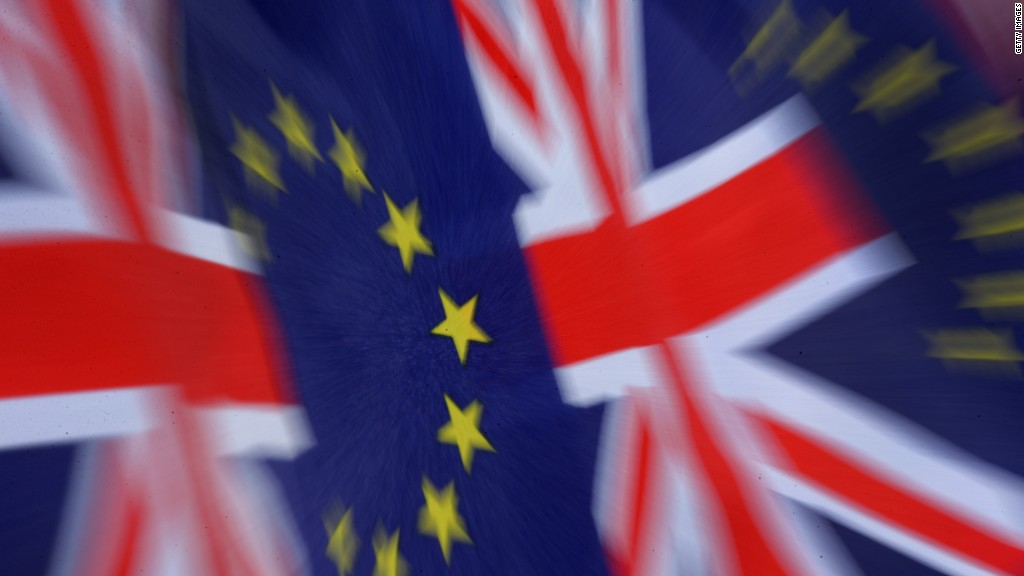
Here we go again: stock market panic.
The British are rocking the world. Not with Beatles or Adele this time, but with the big Brexit referendum vote on June 23 over whether to remain in the European Union, or go it alone.
Investors hate uncertainty, and Brexit offers a supersize dose of it. The usual advice in times of turmoil is to bulk up on bonds. That's exactly what's happening right now.
Stocks are getting dumped globally as investors flee to the perceived safety net of government bonds. But does that make any sense? A lot of smart people warn there could be a bond bubble. And even if the bubble doesn't burst soon, the return on bonds is pretty lousy at the moment.
German bonds now have a negative yield for the first time in history. In other words, you can loan the German government $100 and get back less than $100 when the bond matures. U.S. government bonds aren't that bad of a deal. But the 1.6% yield on the 10-year U.S. Treasury bond is also puny by historical standards.
Here's the better advice right now: take a breath and really, really really think hard before you sell stocks.
Brexit "seems to be the most recent end-of-world scenario," says Brad McMillan, chief investment officer at Commonwealth Financial. But "lots of factors out there say no, the world is not coming to an end."
Related: How much will U.S. stocks drop from Brexit?
It's easy to worry about losses. The human brain is programmed for that. But smart investors don't panic, they stay invested and look for opportunities in times of turmoil.
"You have to stay diversified because there's a lot of uncertainty, but there are also pockets of opportunity," says McMillan. He notes that European stocks and emerging market stock valuations both look a lot more attractive (read: cheaper) than U.S. valuations.
In the U.S., McMillan says consumer stocks make sense. Spending continues to climb -- new data Tuesday show solid retail sales in May -- and many consumer stocks pay decently high dividends, which can help boost your return even if the stock falls.
Related: 10 best investing apps (and sites)
You don't want to time the stock market because it's not an easy thing to do. You have to get TWO decisions right: when to exit AND at what point to get back in. Otherwise, you can lose out on a lot of gains.
"Most investors panic during downturns," says Seth Masters, chief investment officer at Bernstein. "Our industry has been successful at destroying huge amounts of wealth."
Masters says just look at the periods when investors have pulled a lot of money out of stocks. There was massive selling in 2008 (the financial crisis) and 2011 (European debt crisis and U.S. debt downgrade). Taking your money out in either of those years proved to be foolish as the stock market rebounded sharply.
Related: The best cheap investment funds
Yes, there is a lot of uncertainty for investors right now. Brexit, China, what the Federal Reserve will do with interest rates, the 2016 U.S. presidential election, where oil prices are headed. And that's to say nothing of terrorism or the overall belief that the market is overdue for a big pullback.
If you've got millions to invest, Masters says now is a good time to look at "illiquid" investments like funds that lend money to people (basically the fund takes on the role of a bank). Goldman Sachs recommends a fancy hedging strategy known as a "collar" to its top tier clients (this is where you limit your upside gains in exchange for protecting against losses).
But most of us don't have that kind of money -- or those options available. Many illiquid investments require at least $5 million, if not more.
For the rest of us, the key is getting a good investing plan that includes a lot of stocks, some bonds and maybe some commodities (like gold) or real estate. The goal isn't to make money every day, it's to make a lot money over time.
"You need a more diversified portfolio, not less, in a world of uncertainty," says Masters.


